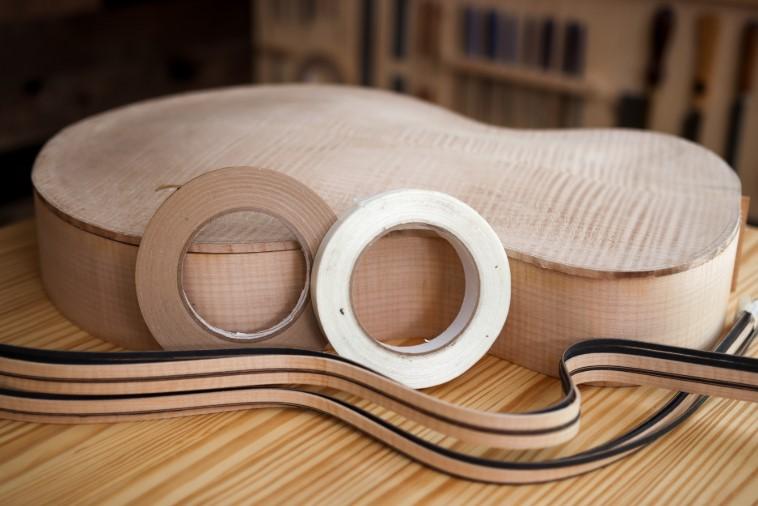Why Acoustic Guitar Back and Sides Matter More Than You Think
Most guitar players pay a lot of attention to the top wood of an acoustic guitar, but what lies beneath the surface often has just as much impact. The guitar back and sides are critical in shaping the resonance, sustain, and overall tone of the instrument. These parts of the guitar reflect sound waves, adding character, depth, and personality to every note you play. #guitar_back_and_sides #tonewood_comparison
Each tonewood used for the back and sides offers its own distinct sound signature. For example, maple guitar back and sides give your guitar a bright and focused tone, while koa guitar back and sides tend to produce a warmer, richer response. These choices aren't just for luthiers—they’re decisions every guitarist should consider when shopping for a new instrument or upgrading an existing one. #tonewood_choice #maple_guitar_back_and_sides
Discover how your wood selection affects your tone in this article: https://presentlee.com/how-acoustic-guitar-back-and-sides-shape-your-sound/
Players who enjoy fingerstyle arrangements or melodic solo work often lean toward figured koa guitar back and sides, which provide an expressive, midrange-heavy sound with stunning visual aesthetics. Meanwhile, those performing live may favor maple for its articulation and clarity under amplification. Either way, the choice of wood should reflect your style and tonal preferences. #fingerstyle_guitar #guitar_tonewood
Even subtle differences in tonewood density or grain can lead to noticeable changes in tonal balance. That’s why it’s worth exploring all your options when browsing guitar back and sides for sale. Don't overlook tonewood just because it's not the top—it's the body and soul of your acoustic sound. #custom_guitar_tone #guitar_sound_quality
Whether you’re recording in a studio or playing on a street corner, the wood beneath your fingertips is shaping what your audience hears. The right acoustic guitar back and sides set can enhance your tone, elevate your playing, and even inspire new musical directions. #acoustic_guitar_back_and_sides #koa_guitar
Most guitar players pay a lot of attention to the top wood of an acoustic guitar, but what lies beneath the surface often has just as much impact. The guitar back and sides are critical in shaping the resonance, sustain, and overall tone of the instrument. These parts of the guitar reflect sound waves, adding character, depth, and personality to every note you play. #guitar_back_and_sides #tonewood_comparison
Each tonewood used for the back and sides offers its own distinct sound signature. For example, maple guitar back and sides give your guitar a bright and focused tone, while koa guitar back and sides tend to produce a warmer, richer response. These choices aren't just for luthiers—they’re decisions every guitarist should consider when shopping for a new instrument or upgrading an existing one. #tonewood_choice #maple_guitar_back_and_sides
Discover how your wood selection affects your tone in this article: https://presentlee.com/how-acoustic-guitar-back-and-sides-shape-your-sound/
Players who enjoy fingerstyle arrangements or melodic solo work often lean toward figured koa guitar back and sides, which provide an expressive, midrange-heavy sound with stunning visual aesthetics. Meanwhile, those performing live may favor maple for its articulation and clarity under amplification. Either way, the choice of wood should reflect your style and tonal preferences. #fingerstyle_guitar #guitar_tonewood
Even subtle differences in tonewood density or grain can lead to noticeable changes in tonal balance. That’s why it’s worth exploring all your options when browsing guitar back and sides for sale. Don't overlook tonewood just because it's not the top—it's the body and soul of your acoustic sound. #custom_guitar_tone #guitar_sound_quality
Whether you’re recording in a studio or playing on a street corner, the wood beneath your fingertips is shaping what your audience hears. The right acoustic guitar back and sides set can enhance your tone, elevate your playing, and even inspire new musical directions. #acoustic_guitar_back_and_sides #koa_guitar
Why Acoustic Guitar Back and Sides Matter More Than You Think
Most guitar players pay a lot of attention to the top wood of an acoustic guitar, but what lies beneath the surface often has just as much impact. The guitar back and sides are critical in shaping the resonance, sustain, and overall tone of the instrument. These parts of the guitar reflect sound waves, adding character, depth, and personality to every note you play. #guitar_back_and_sides #tonewood_comparison
Each tonewood used for the back and sides offers its own distinct sound signature. For example, maple guitar back and sides give your guitar a bright and focused tone, while koa guitar back and sides tend to produce a warmer, richer response. These choices aren't just for luthiers—they’re decisions every guitarist should consider when shopping for a new instrument or upgrading an existing one. #tonewood_choice #maple_guitar_back_and_sides
Discover how your wood selection affects your tone in this article: https://presentlee.com/how-acoustic-guitar-back-and-sides-shape-your-sound/
Players who enjoy fingerstyle arrangements or melodic solo work often lean toward figured koa guitar back and sides, which provide an expressive, midrange-heavy sound with stunning visual aesthetics. Meanwhile, those performing live may favor maple for its articulation and clarity under amplification. Either way, the choice of wood should reflect your style and tonal preferences. #fingerstyle_guitar #guitar_tonewood
Even subtle differences in tonewood density or grain can lead to noticeable changes in tonal balance. That’s why it’s worth exploring all your options when browsing guitar back and sides for sale. Don't overlook tonewood just because it's not the top—it's the body and soul of your acoustic sound. #custom_guitar_tone #guitar_sound_quality
Whether you’re recording in a studio or playing on a street corner, the wood beneath your fingertips is shaping what your audience hears. The right acoustic guitar back and sides set can enhance your tone, elevate your playing, and even inspire new musical directions. #acoustic_guitar_back_and_sides #koa_guitar
0 Comments
0 Shares

